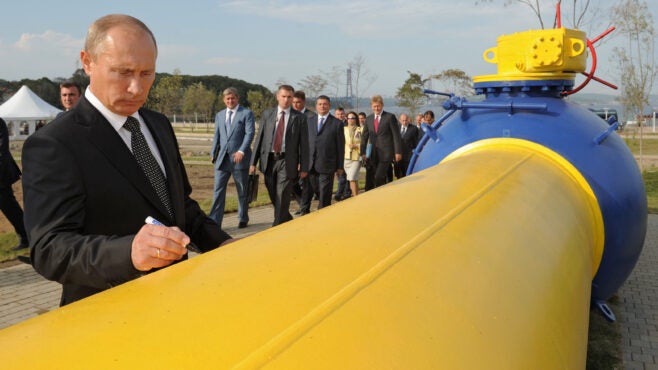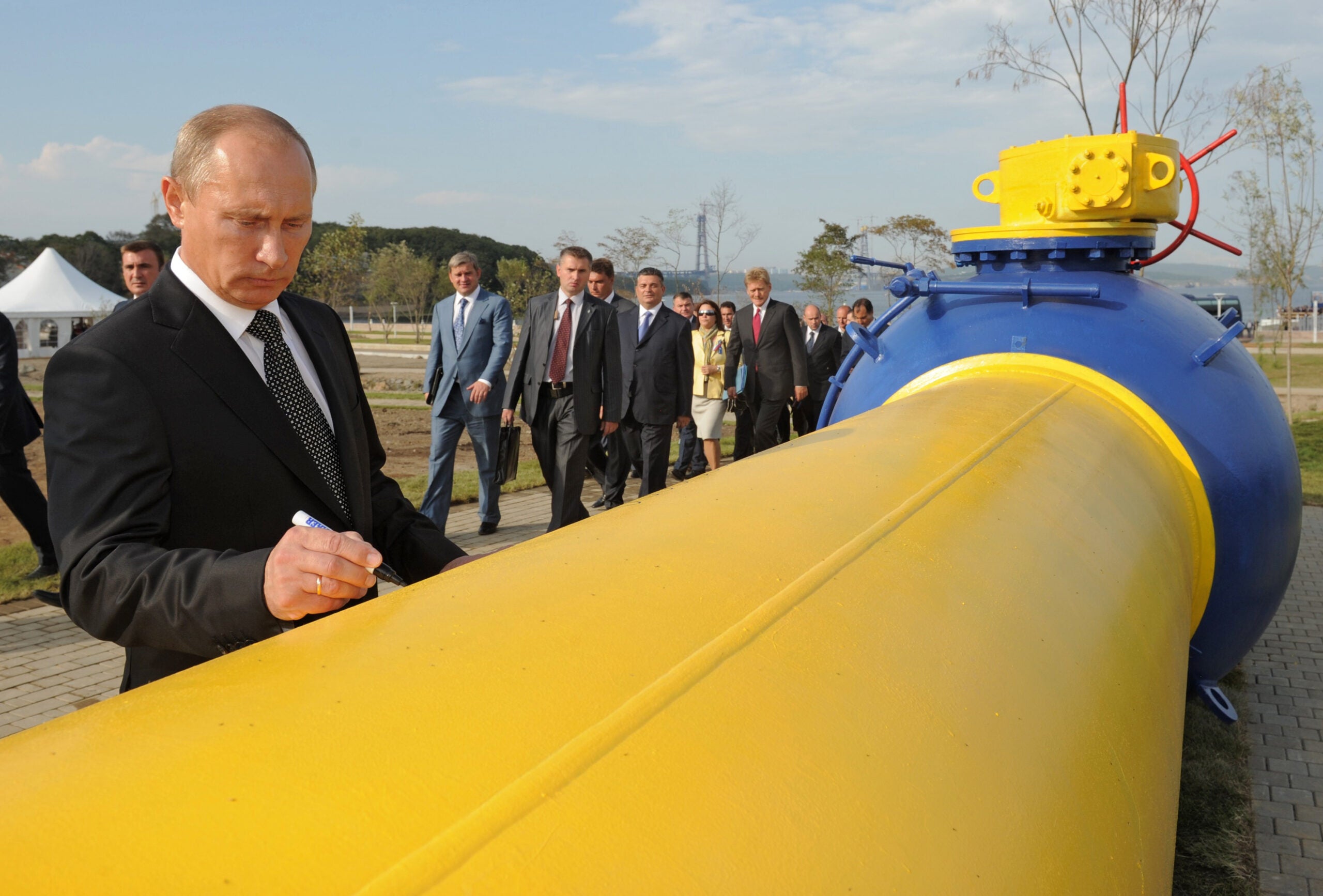The steely determination of Margaret Thatcher, the passionate appeal by Ronald Reagan to “tear down this wall” and the democratic epiphany of Michael Gorbachev are all generally credited with enabling the collapse of the Soviet Union. The price of oil is rarely related to this momentous event, yet some believe it alone is responsible for the end of the Cold War. Likewise, today the geopolitics behind a global clean energy transition are only hazily evoked, but for countries highly reliant on fossil fuels such as Russia, the stakes are high. Despite climate sceptic rhetoric, there are signs the country is looking to move with the times to avoid political upheaval that could be as great as the fall of the Berlin Wall.
Yegor Gaidar, former acting prime minister of Russia under Boris Yeltsin, posits this link between oil price volatility and its impact on the inefficient Soviet economy and the historic fate of the country in his book Collapse of an Empire.
Gaidar traces how, following the Arab oil embargo of 1973, oil prices shot up. Russian oil revenues grew, as did the income of other oil producers, allowing them to purchase more arms from Russia. These sales brought more hard currency to Moscow and meant the Soviet government could spend more generously at home and strengthen its support for dependent regimes abroad. High oil prices delayed vital economic reforms and bankrolled two key parts of the Soviet social contract: fixed prices for all goods, and funded privileges and development projects for regional elites. When oil prices collapsed in the mid-1980s, cash shortages and economic inflexibility triggered the chain reaction of political disintegration. In 1990, all fossil fuel export revenues were spent on paying back foreign debt and related interest.
This theory might be over-simplistic, but the economic pain caused by low oil prices and its impact on the country are well remembered in Russia. Whether political lessons have been learnt is less certain.

Reliance on fossil fuel revenue
Since the 1980s, some sectors of the Russian economy have moved on. The country has transformed from being a major importer of agricultural products into a major exporter. It has also reformed its banking and tax systems and is now more resilient to external shocks. However, Russia’s reliance on export revenue from fossil fuels has not changed, and low oil prices since 2014 have left the country struggling to return to a path of healthy economic growth. The Covid-19 pandemic has made this problem worse.
Instead of backing the same tired, old horse, Russia could focus on how the clean energy transition could dovetail with economic ambitions. Oil and gas prices are likely to remain low as appetite for fossil fuels declines in line with climate goals.

US Tariffs are shifting - will you react or anticipate?
Don’t let policy changes catch you off guard. Stay proactive with real-time data and expert analysis.
By GlobalDataDemand for coal, oil and gas is already falling in the EU and will continue to do so as the bloc attempts to reach its 2050 climate neutral target. The European Parliament recently voted to increase the current 2030 greenhouse gas reduction target from 40% to 60% (from a 1990 base). While the European Commission is still advocating a 55% target, both would result in lower natural gas and other fossil fuel imports from Russia. China is the other large fossil fuel market where Russia foresaw future growth, but it too looks set to change direction, having this month announced a carbon neutrality target for 2060.
Russia will have to adjust its long-term fossil fuel export plans in line with these changing energy plans. However, it is not only trade that is at stake here.
The climate neutrality targets of Europe and China mean not only the decline of fossil fuels imports, but also the acceleration of their research, development, production and export of clean energy technologies. Japan and South Korea have also committed to climate neutrality by mid-century and are leading in the research and production of batteries, electric cars, robotics and other technologies associated with the zero-carbon transition. The US, despite pulling out of the Paris Agreement, remains a clean technology leader, while growing numbers of large companies are coming out in support of ambitious climate targets with plans to power their production on carbon-neutral energy.
Russia needs to decide whether it wants to join and move forward in this new world.
Clean energy action
So far the achievements of Russia in terms of the clean energy transition are patchy and modest. For years, President Vladimir Putin has expressed scepticism about climate change and cynicism about European climate ambitions. In 2010, he said that if Europe stopped buying gas from Russia it would have to heat its homes with wood, namely Siberian wood bought from Russia.
Things are changing, however.
Two years ago, Putin appointed former Chechen Prime Minister Ruslan Edelgierev as his climate change adviser. A year later, Russia formally joined the Paris climate agreement. Edelgierev has been increasingly active in promoting climate policies and legislation, and recently suggested Russia should introduce its own carbon emissions trading system as a response to the European Green Deal and its plan for a Carbon Border Adjustment Mechanism.
These words and actions should not be seen as a sudden embrace of the scientific realities of climate change. The dominant political view on climate in Russia, including that expressed by Edelgierev, remains driven by diplomatic and economic concerns. The country’s decision to join the Paris Agreement after the annexation of Crimea could be seen as an act to mitigate a diplomatic crisis rather than a sudden awakening to the impacts of climate change. Most important for Russia are the economic risks of the global move to a low-carbon economy, the possible contraction of fossil fuel markets, and the risk of remaining outside the technology revolution.
And these concerns are leading to some clean energy action.
Lukoil, the second-largest Russian company after Gazprom, now owns a very modest, for its size, 84MW wind power plant in Romania and is also slowly entering the solar photovoltaic business. Rosneft, the leading Russian oil company, is planning renewable installations for its remote operations that require autonomous energy supplies. Gazprom has developed a hydrogen strategy and is planning to start producing what it claims will be green hydrogen from 2024. Details on the technology they will use to produce this hydrogen are vague. Methane pyrolysis, which uses much less energy but is not yet commercially developed, is occasionally mentioned. This process involves heating natural gas to high temperatures to generate hydrogen, with the only residue left being carbon in a solid, rather than a gaseous, form.
More ambitious are the operations of Rosnano, a company led by Anatoly Chubais, former Deputy Prime Minister of Russia and one of the architects of privatisation under Yeltsin. Rosnano is developing and commercialising new technologies, including those in the field of renewable energy. In 2017, the company set up a Wind Energy Development Fund with the Finnish company Fortum. Together they have built 430MW of wind and solar capacity and are developing another 1,470MW. They have also won tenders to build a further 1,823MW of wind power generation capacity in the future. However, it seems its ambitions will remain limited until the government changes its policies. “Energy production in Russia is governed by state decisions,” says Fortum on its website.
The most ambitious statements in the low-carbon sector are probably from Rosatom, Russia’s largest electricity producer and a global nuclear technology leader. Rosatom recently announced its intention to claim 10% of the global lithium market. It has already started producing and exporting lithium-ion batteries and is planning to scale- up production under the brand Renera. Rosatom could start presenting itself as a global climate leader on the basis of a large nuclear, lithium and energy storage portfolio.
The Rostov region, in south-west Russia, has its own ambitions. It is aiming at 20% renewable electricity by 2022 and is trying to turn itself into a sort of Russian California, at least as far as renewable energy is concerned. The Rostov region includes part of the Azov Sea, which is connected to the Black Sea, deemed to have the best offshore wind resource in the region. Part of the Azov Sea, however, includes the exclusive economic zone of annexed Crimea, which will clearly be a barrier for development if a solution for Crimea is not found. Further to the east, the Caspian Sea has even greater offshore wind potential.
Concern for its national security and territorial integrity may be another factor that would push Russia to act on climate change. The view among some in Moscow that global warming will benefit Russia by reducing heating costs or increasing agricultural production, as detailed in a government climate adaptation plan earlier this year, is short-sighted. The thawing of Siberian frozen grounds that releases significant methane emissions, floods and droughts in the south are also likely impacts of climate change that could lead to significant environmental and economic damage.
The move worldwide to carbon neutrality, future loss of fossil fuel revenues, technology competition and national security threats should create a perfect strategic storm for the Russian government. There are some signs Moscow is waking up to this new world, but how it will respond is not yet clear, and the change needed will be disruptive given the country’s vast fossil fuel resources, its addiction to export revenues from them, and inefficient energy use at home. Nonetheless, sticking with the status quo in the face of global change will cause even more damage, economically and environmentally, with potentially far-reaching political, and even national security, consequences.
Julian Popov is a fellow of the European Climate Foundation, chairman of the Buildings Performance Institute Europe and the former Minister of Environment of Bulgaria. He is a member of the Advisory Council of EIT Climate-KIC and sits on the boards of several European energy policy think tanks.





